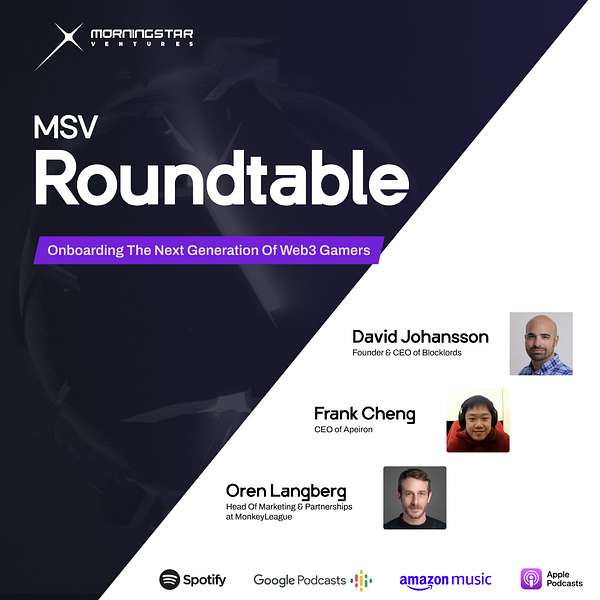
MSV Podcast
If you want to learn more about crypto, investments, new projects, the market, and the blockchain industry, this podcast is for you!
Don’t miss our weekly MSV interviews and roundtable covering exciting topics and conversations.
Ensure to subscribe not to miss an episode. Enjoy!
MSV Podcast
Roundtable: “Onboarding the Next Generation of Web3 Gamers”
Guests:
- David Johansson, Founder of Blocklords
- Frank Cheng, CEO of Apeiron
- Oren Langberg, Head of Marketing at MonkeyLeague
Top 3 Key Takeaways:
1. Web2 and Web3 have a lot to learn from each other
As the industry of Web3 gaming is still at the beginning of its time, all three guests agree that we have yet to see a high-quality and complete game in the space. However, when asked what Web2 game developers can learn from Web3, three key points were outlined as qualities that make Web3 unique and exciting.
- Ownership
- Access to liquidity
- Community-driven content
- Marketing Features
- In-game economy, along with token supply & demand
Crypto gaming is surrounded by technology, communication, and perception barriers, hindering Web2 gamers from onboarding. The speakers agree that it makes sense for Web2 gamers to come into Web3, as already billions of gamers spend money and time on games. Still, with the transition from understanding a new business model, tokenization of assets, and creating a wallet, going through KYC, a lot is posed against Web2 gamers to make that transition. By creating fun games that separate the meta-features from the main gameplay, we can enter a future where one's entire digital experience will be ownable and liquid – making many exciting products. Ultimately, we all need to learn from eachother.
2. Building upon the best Web2 games, Web3 gaming should add components to enhance experiences
The conversation moved on to the sustainability of the Play-to-Earn model. All speakers agree that, at the moment, many gamers are coming onto Web3 intending to maximize profits and speculate on the price. This has yet to help Web3 game developers build their core user group, leading to an unsustainable game that no one wants to play.
Games must be fun-first, and any game that uses an earning mechanism to acquire users will be challenging. In Web2 gaming, it's the best players earning the most, not speculative users. We must shift to skill - and achievement-based earning models in Web3 gaming, a concept that nods to win-to-earn rather than play-to-earn.
Web2 distributors and publishers must change their mindset to fit the Web3 distribution model.
We haven’t seen any Web3 publishers and distributors as big as Steam yet. All speakers agree that “traditional” game publishing companies focus on user acquisition, distribution, live handling of operations, and monetization. Web2 publishers must change their mindset when working with Web3 games, as builders mainly focus on driving value to the Token, in-game NFTs, and the users. As Web2 publishers are so hardwired to acquisition and monetization, in the future, we might be seeing more Web3 games self-publishing or the “early” adopter Web2 publishers start to work with blockchain games because they see the potential in the market.
When it comes to a publisher like Steam, it has yet to be able to take that spot. Perhaps in the upcoming years, Web3 will come up with its version of Steam, or on the flip side, Steam will start to support Web3 as the industry grows.
3. Web2 distributors and publishers must change their mindset to fit the Web3 distribution model
We haven’t seen any Web3 publishers and distributors as big as Steam yet. All speakers agree that “traditional” game publishing companies focus on user acquisition, distribution, live handling of operations, and monetization. Web2 publishers must change their mindset when working with Web3 games, as builders mainly focus on driving value to the Token, in-game NFTs, and the users. As Web2 publ